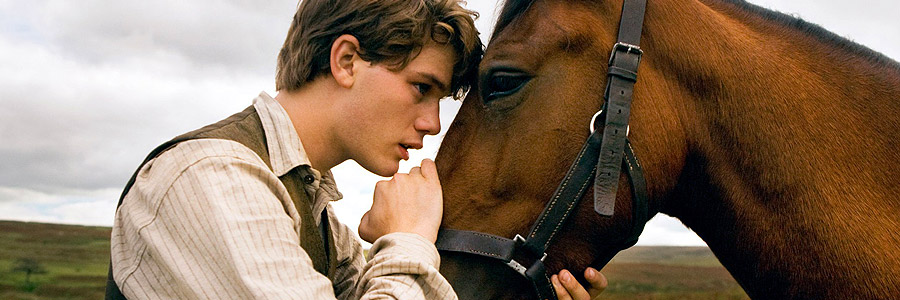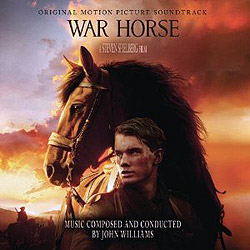
War Horse

WAR HORSE (CD)
Sony Music Entertainment
Release date: January 16th, 2012
Running time: 65:33 minutes
Composer: John Williams
Film Review by Jamie Suckley
Think of an epic film: the emotions created, the power of the images. Now imagine that film with no music. Suddenly the scenes become dull. Lifeless.
An epic film deserves an epic soundtrack, such as those in ET: The Extra-Terrestrial (1982), Jurassic Park (1993) and Jaws (1975). With John Williams’ score for War Horse, he has however delivered in a different sense, instead we are presented with a much more pastoral piece.
War Horse is a 2011 film directed by Steven Spielberg, based on the 1982 children’s book of the same name by British author Michael Morpurgo, and a stage production by Nick Stafford in 2007. Set before and during World War 1 with a picturesque Devon backdrop, Williams reflects on the simplicity of the scenery, with often few instruments playing at once.

The story begins with the birth of a thoroughbred foal called Joey, bought at auction by a Devon farmer, Ted, as a ploughing horse. Despite more suitable horses for the job in hand, Ted offers a high bid for Joey to spite his landlord, therefore leaving himself unable to pay his rent. After promising the landlord that the money will be paid by planting a field of turnips, Ted’s son Albert begins to train the young horse to prepare him to plough. Much to the amazement of the villagers, Albert and Joey defy the odds and have the field ready to plant the turnips; however when a heavy rainstorm destroys the field, Ted has no option but to sell Joey as a cavalry horse – much to the dismay of Albert.
What then follows is the difficult journey of the two separated friends, the challenges they face when confronted with war and the hope of being reunited someday.
From the opening flute solo of the first track, Dartmoor, 1912, the score consists heavily of sweeping harmonies provided by brass, strings and woodwind, playing homage to the period in which the film is set. Melodies throughout the score are often portrayed in a call-and-response form.
Williams’ portrayal of the bond between the characters and of the animals themselves is reflected in tracks such as the playful Bringing Joey Home, and Bonding.
The Charge and Capture is the turning point of the score, with the brass firmly domineering the soundtrack from here on in. The theme of war is clearly depicted in the often dissonant harmonies and marching rhythms accompanied by military-style percussion. Williams’ ability to capture the emotion of the characters in his music portrays the inner fears and anticipation of war.
- 1. Dartmoor, 1912
- 2. The Auction
- 3. Bringing Joey Home, and Bonding
- 4. Learning the Call
- 5. Seeding, and Horse vs. Car
- 6. Plowing
- 7. Ruined Crop, and Going to War
- 8. The Charge and Capture
- 9. The Desertion
- 10. Joey s New Friends
- 11. Pulling the Cannon
- 12. The Death of Topthorn
- 13. No Man s Land
- 14. The Reunion
- 15. Remembering Emilie, and Finale
- 16. The Homecoming
Hard-hitting scenes are shadowed by low, adagio style orchestration, in particular during The Death of Topthorn and The Reunion, with the music becoming more lento, and dissonant harmonically.
With comparisons in style to that of Ralph Vaughan Williams, a British composer born in 1872, Williams delivers in creating a patriotic British feel to the score, focusing on creating a feeling of splendour within the beautiful surrounding scenery, and the people that live within it. We begin to personally connect through the music with the emotions felt by the characters, the journey they have taken and the often-troubling situations they have faced during the war. The haunting piano solo in Remembering Emilie, and Finale is in my opinion the perfect example of this.
The return of the original melody in The Homecoming reunites us with the characters back home. The war is over, and two old friends are finally back where they deserve to be – together.
Albeit in my personal opinion a slightly different direction for Williams, the soundtrack is still identified as his work thanks to the instrumentation used and the distinctive solo melodies throughout the soundtrack. John Williams has indeed once again created an epic soundtrack for an epic movie. War Horse is magnificent and stimulating throughout, it gives us hope.
Regardless of genre, Williams has the ability to unearth emotions within an audience that film alone could never reach.

Phil Blanckley
Phil is a 27-year-old classically trained musician from Sheffield with qualifications in Popular Music, Classical Music and a BA (Hons) in Creative Music Technology and Sound Recording. He likes nothing better than locking himself in the studio and composing music of all genres.
Phil became interested in composing after learning how to play the Cello and Clarinet at a young age, and has never looked back since. His favourite composer is Danny Elfman, whose unconventional harmonies and rhythms in scores such as Edward Scissorhands still manage to bring a tear or two to his eye.
You can find him on Twitter @PhilBlanckley.
© 2022 STATIC MASS EMPORIUM . All Rights Reserved. Powered by METATEMPUS | creative.timeless.personal. | DISCLAIMER, TERMS & CONDITIONS
HOME | ABOUT | CONTACT | TWITTER | GOOGLE+ | FACEBOOK | TUMBLR | YOUTUBE | RSS FEED
CINEMA REVIEWS | BLU-RAY & DVD | THE EMPORIUM | DOCUMENTARIES | WORLD CINEMA | CULT MOVIES | INDIAN CINEMA | EARLY CINEMA
MOVIE CLASSICS | DECONSTRUCTING CINEMA | SOUNDTRACKS | INTERVIEWS | THE DIRECTOR’S CHAIR | JAPANESE CINEMA





